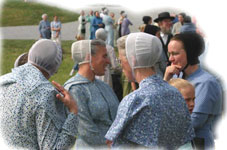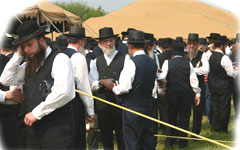
Similiar to the Amish Plain People are the German Baptist Brethren are also known as Dunkers because they participate in a three-fold immersion baptism. The influence of the American culture created difference of opinion in the fold about the levels of influence modern America would have in their meetings. The Progressive Brethren favored Sunday Schools, higher education, evangelism, and spreading their mission to foreign lands to help spread their beliefs of the church, and they wanted to blend more with the American culture, not remaining as separate, as a way to reach out to them with the gospel.
Unlike the Amish the Old Order Brethren believed adaptation to the culture and Sunday School would lead them away from their old, established ways of practicing their faith. Around 1880, a full split in the German Baptist Brethren occurred.
Today, the Dunkers, or Old Order German Baptist Brethren maintain the old practices, and the ways of the original group; they are opposed to Sunday schools or missionary activity; and they have an unsalaried minister. They have the following beliefs and practices. To be baptised, they kneel in the water and are dipped forward three times, in recognition of the three persons of the Trinity. The Love Feast, or Communion is held in the evening, where they practice foot-washing to demonstrate their attitude of service. They refuse to take oaths and to bear arms.

Old Order German Baptists drive cars, usually black, they have electricity (but no TV), and the women are encouraged to help supplement the family income by working in the home, either by making Amish Quilts to sell, providing quilting services with patchwork Amish quilt tops, or running a small dry goods store (fabric/general merchandise). The ladies dress plain, by wearing below-the-knee dresses in fabrics with small prints of flowers with a modesty cape and matching apron, and a loose weave (organdy almost like tulle) head covering or prayer veil, covered with a black bonnet in the winter. The men wear dark or black pants with suspenders, plain colored collared shirts and straw hats, or black hats in winter. Typically, the married men wear beards.
